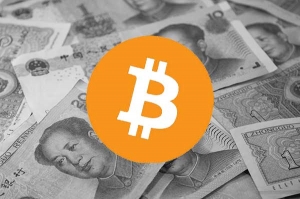China Blockchain Research
With the launch of its cryptocurrency Libra, Facebook is diving headfirst into digital banking. The U.S. social-media giant can draw on its massive global network of 2.3 billion users as it forays into finance. Yet Facebook will not be introducing Libra to China, which has the world's largest number of internet users. China blocked Facebook a decade ago and has moved to cripple crypto to control systemic financial risk and discourage capital flight. If Libra is a success, being excluded from it could have major ramifications for China's fintech development. At the very least, Beijing's own fintech system would be further isolated from the rest of the world.
Revisiting the prospects of a digital renminbi
China has a complicated relationship with blockchain technology. Until the fall of 2017, China was the largest market for Bitcoin. But Beijing ultimately couldn't tolerate the decentralized nature of virtual currency and its utility in allowing Chinese citizens to evade capital controls, or in some cases, launder money. The ensuing crypto crackdown may turn out to be much like President Xi Jinping's anti-corruption campaign: never-ending.It's now clear that China will not allow decentralized digital currency in its financial system.
Less than two years ago, China was the world's virtual-currency capital by trading volume. On the eve of the great crypto crackdown in September 2017, China accounted for 90% of the world's Bitcoin trading. Miners capitalized on cheap electricity rates in far-flung provinces to churn out as many digital coins as their power supplies permitted. Crypto bulls lauded Beijing's apparent embrace of distributed ledger technology and decentralization.
As it turns out, the celebration was premature. In a move to control what it perceives as systemic financial risk, Beijing has been gradually squeezing the life out of the China crypto market. The Chinese government has banned ICOs and the use of fiat currency in virtual-currency purchases as well as blocked related websites. Recently, it began working to eliminate crypto mining. At the same time, the WeChat super app banned crypto trading effective May 31.
Is China the world's blockchain leader?
China may be the only country in the world able to stamp out cryptocurrency while repurposing its underlying blockchain technology. Decentralization becomes centralized under this scenario, as private enterprises implement blockchain solutions in line with central government directives. It's a bit like the "socialist market economy." The key to success here is acceptance of seemingly contradictory principles, one of Beijing's specialties.
China's Blockchain Regulation
Paradoxes abound in the Chinese economy, as the long arm of the state regularly collides with resilient entrepreneurial activity. Nowhere is this more apparent than the fintech segment, where Beijing is repurposing technology designed to facilitate freewheeling financial activity as an instrument of state control. We would like to ask enigmatic Bitcoin founder Satoshi Nakamoto to comment - if only we knew how to get a hold of him.
China steps in to regulate blockchain
The crypto community is aghast at Beijing's move to regulate blockchain, which will be effective February 15. "Blockchain under threat in China," proclaimed Coingape in January 14. report. The Invest in Blockchain site said that "the Chinese blockchain industry is about to come under heavy scrutiny" in a Jan. 13 article.
As promised, China's government is monitoring OTC crypto transactions and one third is paid by Alipay
Cryptocurrency control in China seems to be getting stronger since the ban on September 4th, 2017. In a bid to further limit the use of crypto in China, the National Committee of Experts on Internet Financial Security Technology (IFCERT) is now monitoring 56 platforms that offer over the counter (OTC) cryptocurrency transactions.
Strict ICO Regulations China Are the Right Choice. But Is This ‘One-size-fits-all Policy’ the Right Answer?
There has been significant news published in the last week regarding regulation around initial coin offerings (ICOs) especially around the Chinese Government's position on ICOs in China. Finally, at 3.00pm, September 4th this Monday, seven important Chinese government departments including the PBOC, issued an announcement to stop any ICO transactions and defined ICOs in China as illegal fund raising. Strict ICO regulatory is the right choice but is this ‘One-size-fits-all Policy’ the right answer?
China, Regulation, and ICOs
For several weeks earlier this year, the PBOC (Peoples Bank of China) focused on bitcoin exchanges and halted crypto-currency withdrawals from the main exchanges; now ICO’s (initial coin offerings) have grabbed their attention. With ICO’s growing in popularity they are hard to ignore, In China since the beginning of the year there have been 65 ICO’s, that have raised over 2.6 billion RMB. As such, the PBOC has been considering banning ICO’s as they expose investors to a very high risk and “illegally absorb public funds.”
A brief on ICOs
Over the past few weeks, little-known ICOs have grabbed the media's attention. ICOs, or 'Initial Coin Offerings', have become a new way for individuals and start-ups to obtain funding. A significant number of these ICOs are originating from China, so we decided to take a look at the dynamics behind these new funding vehicles.
More...
Blockchain technology has become one of the hottest topics in China Fintech. So when Ant Finance, the most valuable tech unicorn company in the world, announced they were working on a blockchain-based solution for the charity space, it captured lots of attention - but what is behind the move?
Last week China’s central bank announced the possibility of launching its own digital currency on its official website. What is behind the government's push to launch a digital currency? Control money outflow? Better monitor cash transactions?
So over the past week, the internet has been aflutter with talk of Bitcoin and China again. A March 10th Goldman equity research note entitled 'The Future of Finance' offered a few comments about Bitcoin in China seem to have reignited the debate about Bitcoin's place in the Middle Kingdom. There are a lot of misconceptions out there, we felt we needed to set a few of them straight.
Bitcoin mining in China on your own is over
According to the latest hardware specifications of bitcoin mining manufacturers, even with it no longer makes sense for individuals to mine on their own - even in China where electricity is somewhat cheaper. Except if they are willing to wait a long time.







